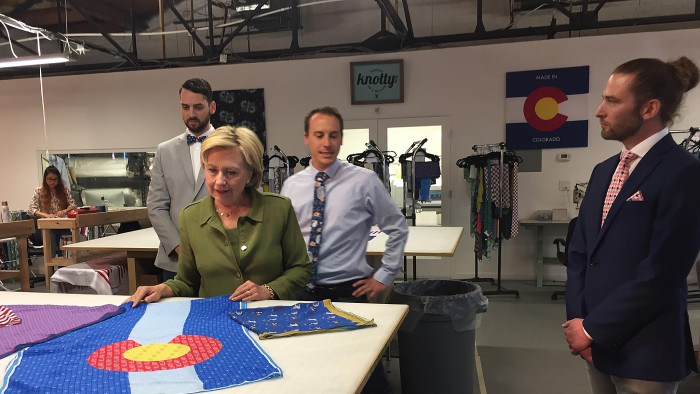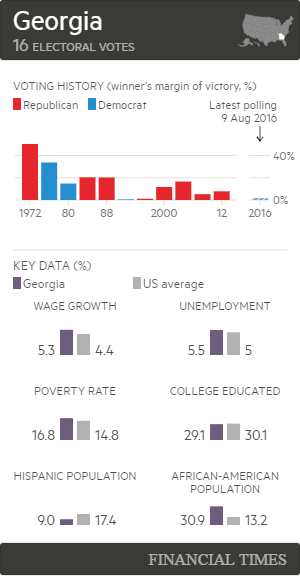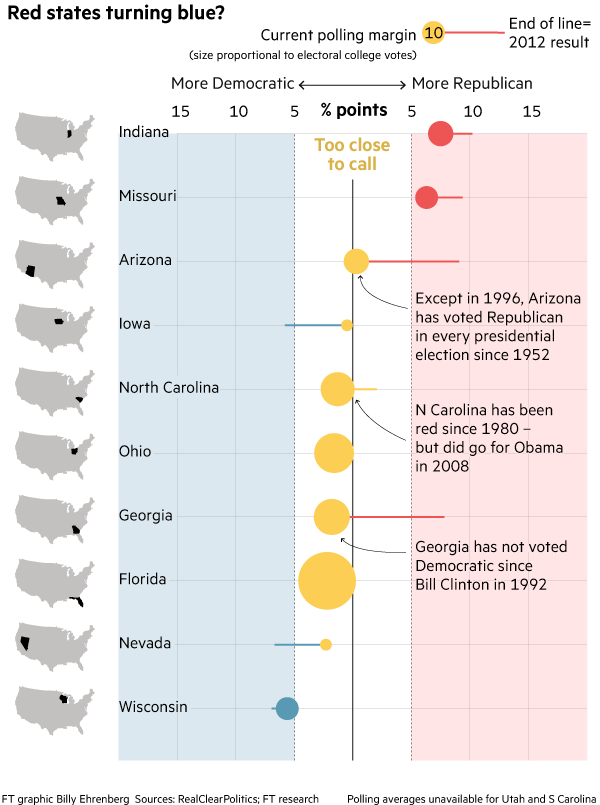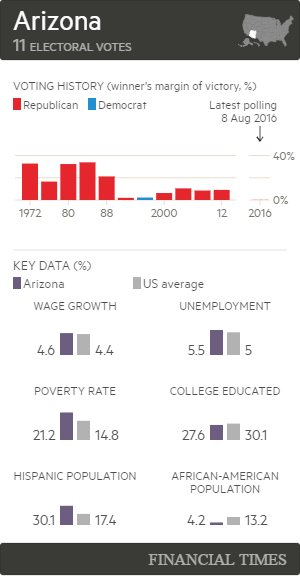Clinton targets Trump on Republican turf

Roula Khalaf, Editor of the FT, selects her favourite stories in this weekly newsletter.
Hillary Clinton’s campaign is gearing up to mount a serious challenge to Donald Trump in traditionally Republican states in a sign that the 2016 election is scrambling the US political map.
In a scenario that seemed unimaginable six months ago, the Clinton campaign has begun beefing up its on-the-ground operations in Arizona and Georgia — two states that have not voted for a Democrat in a presidential election since the 1990s.
The moves come with polls showing the Democrat gaining ground in right-leaning states as the Trump campaign struggles to promote its economic message this week above a din of controversies.
Despite recent setbacks for the billionaire property mogul, pundits say the presidential race is likely to tighten as election day in November approaches.
But if Mrs Clinton could win Arizona or Georgia it would signal a potentially big national victory was in the offing, a Democratic operative said, adding: “If we decide at some point to go into Arizona that probably means the race is over.”
Both states are home to moderate white suburban voters who Democrats think could turn against Mr Trump, together with left-leaning populations of Latinos in Arizona and African-Americans in Georgia who the Clinton campaign wants to get to the polls in large numbers. The campaign’s new organisers in both states will be working not just for the presidential candidate but for down-ballot Democrats, too, as part of a long-term effort to turn those states Democrat blue in time.
Even if the former secretary of state does not prevail, expanding ground operations in unusual states is a common electoral gambit to distract a rival campaign and draw money and people away from other swing states.
Dennis Goldford, a political-science professor at Drake University, said: “You always, if you can, want to try and make your electoral opponent defend his home turf. Any resources Republicans spend to defend Utah or Georgia would be resources that they’re not spending in North Carolina [a conventional swing state].”

Mr Trump, however, may be immune to such tactics, as he has run a bare bones campaign relying more on Twitter and television interviews than paid-for advertising and on-the-ground campaign staff.
An attempt to reset his campaign this week with an economic speech continued to founder on Thursday, as he was forced to defend his claim that President Barack Obama was “the founder of Isis”. The previous two days were dominated by comments that prompted claims he was inciting gun owners into violence against Mrs Clinton.
In Georgia, which Democrats have not won since Bill Clinton’s victory in 1992, a Real Clear Politics average of recent polls has given Mrs Clinton a lead of 1.8 points in the state.
“Georgia is Hillary Clinton’s and I’m glad she’s going to be campaigning there,” said Harry Reid, the top Democrat in the US Senate, last week.
In Arizona, which has voted Republican in nine of the past ten presidential election, Mrs Clinton trails her rival by just 0.3 percentage points, according to the RCP average.
Another state that Democrats hope to put in play is Utah, where Mr Trump suffered a resounding defeat at the hands of Ted Cruz in a primary election.
In a state that is 60 per cent Mormon, Mrs Clinton is being aided by Mitt Romney, a former White House candidate widely respected by fellow members of the faith, who has been a vociferous Trump opponent and labelled him as “a phoney, a fraud”.
But Marcus Stevenson, the Democrats’ Utah party secretary, said Mrs Clinton was up against the traditions of a conservative state where he said many people reflexively vote Republican. “Republicans don’t have to campaign. It is up to the Democrats.”

Mr Goldford said that it was too early to write off Mr Trump, noting that in August of the 1988 campaign Michael Dukakis had a double-digit lead over eventual winner George H W Bush. “The last thing I would say about the landscape is that it’s frozen. It’s certainly still fluid.”
He noted that even though Democrats were heartened by demographic trends, these would not matter if people did not vote. “Three core constituencies for Democrats are single women, young people and minorities. They may all be increasing in populations certainly nationwide but they vote the least regularly and the least reliably.”

In fast-changing Georgia, the African-American proportion of the electorate has risen to over 30 per cent of the electorate while the white share has declined.
In Arizona, Mr Trump’s tough rhetoric on immigration has appealed to white conservatives conscious of the state’s border with Mexico. But it has incensed many Hispanic Americans, who account for nearly 22 per cent of eligible voters.
In a sign of its concern that Arizona could be in play, the Trump campaign last week sent vice-presidential candidate Mike Pence to two rallies in the state.
Charlie Cook, publisher of the Cook Political Report, said that if Mrs Clinton could win Arizona, Georgia or Utah she would be the next president.
“She would already have hit [the 270 electoral college votes needed for victory] before any of those tipped over. They would be either icing on the cake or salt in the wounds, depending upon whether you are a Democrat or a Republican.”
Comments